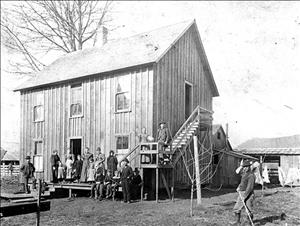On November 1, 1897, E. G. "Ed" Pelton and 14 other progressive-minded individuals gather in a farmhouse in Skagit County, near Edison, to organize a socialist community, which they call the Equality Colony. The group is part of the National Union of the Brotherhood of the Cooperative Commonwealth (BCC), which seeks to put theories of the Progressive movement into daily life and to convert the new state of Washington to socialism. What they mean by socialism is a system of cooperative production and distribution of goods, plus selecting leaders by means of a direct democracy. The experiment will endure less than 10 years.
Reform, 1890s Style
The 1890s was a decade of change in Washington politics and in the nation. Several groups of reformers sought to come together to combine forces in the newly formed (1889) state. Labor organizations allied with groups with such diverse interests as public ownership of the railroads and woman suffrage in an effort to forge a strong voice in government. In 1892, eight populists were elected to the state legislature. Populist William Jennings Bryan was the Democratic presidential nominee.
Amidst this progressive movement, several communities formed in which people could live out the theories of the progressive perspective, namely that the world was destined to become a better place. Several in the progressive movement felt that the best way to demonstrate the truth of this was to organize colonies of like-minded believers who would put the theories into practice in daily life. In the words of Normal Wallace Lermond, organizer of the National Union of the Brotherhood of the Cooperative Commonwealth (BCC):
"The people must be aroused from their present lethargy, indifference, and despondency. The country must be stirred from center to circumference. And the quickest and best way to do this is by colonizing a state such as Kas. was colonized prior to the Civil War. The example thus set would be contagious, and neighboring states would not be slow to follow the same road" (LaWarne).
The goals of the Brotherhood were:
- to educate people in the principles of socialism;
- to unite all Socialists in one fraternal organization;
- to establish cooperative colonies and industries, and so far as is possible, concentrate these colonies and industries in one State until said State is socialized.
In September 1897 Lermond sent G. E. (Ed) Pelton to find a suitable site for the Brotherhood's first colony. The area between the Canadian border and Portland, Oregon, was considered ideal due to its climate, natural resources, and sparse population. With a colony here, the Brotherhood sought to convert the state to socialism and, eventually, to convert the nation. Pelton purchased 280 acres in Skagit County on behalf of the organization. In November the first members met to formally organize Equality Colony.
Equality in Practice
The founders prepared the colony for the anticipated arrival of new members the following spring. Pelton continued to correspond with Lermond on the status of the community. During 1898, the membership grew to about 200 and Lermond and other board members arrived to begin to live the theory for themselves. The growth was not unnoticed by the colony's neighbors who grew wary of the "campers" in their midst.
Members of the colony first built many of the buildings needed for daily life: workshops, a schoolhouse, cabins, and shared houses. Colonists then began to specialize their labor; some turning to woodworking or blacksmithing or sewing. Outside of the ideals of communal living and socialism, the members did not always have other philosophies in common. Beliefs differed in the areas of religion, vegetarianism, and the use of tobacco and liquor.
Differences of Opinion
Despite their commitment to socialism, rumblings of dissent rose almost from the first. In the spring of 1898 the arrival of the Board of the Brotherhood of the Cooperative Commonwealth caused friction when they stationed themselves in the town of Edison rather than at the still unfinished colony.
Disagreements of a chicken-and-egg nature were heard at General Assembly meetings. Did the Brotherhood (the organization) exist to further the success of the colony, or was the colony organized merely to prove the point of the Brotherhood? Pelton and Lermond became adversaries rather than compatriots.
A Split in the Leadership
In late summer 1898, Lermond suddenly left the colony and the Brotherhood to return to Maine. Pelton had prevailed, but with Lermond's departure came a less appealing consequence -- an enormous drop in national support for the colony. Lermond had been the founder of the Brotherhood and, by extension, of the colony. His return to Maine to focus on the socialization of America left the colony without a nationally known leader.
Pelton redirected the focus toward making the colony self-sustaining. Efforts to set up new colonies and to socialize the state were put on hold. Pelton's leadership of the colony ended in 1901 when he was killed by a falling tree.
Interlopers With a New Philosophy
Though the Equalityites eventually came to hold more than 600 acres of land and to raise livestock and crops, they did not serve as the shining example of socialist ideals put into practice as they had intended to do. By 1905, a group of outsiders led by Alexander Horr of New York, believed that the colony needed to be remade. Horr believed the colony would do better to have groups of colonists compete with one another rather than cooperate. The name of the colony was changed from Equality to Freeland. The changes caused major dissension. By February 1906, suit was filed in Superior Court in Skagit County to dissolve the colony. By June 1907, the final disposition of the property had been made.
The focus of socialism in America had moved past the attempts at colonization and new efforts were directed at influencing politics directly rather than by example.

